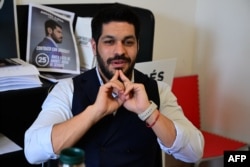Uruguayan center-left opposition leader Yamandú Orsi, whose political ambitions were fueled by his experience growing up in a dictatorship, is pollsters’ favorite to win the first round of the South American country’s presidential election on Sunday.
The 57-year-old former history teacher and local mayor seeks to unseat the ruling conservative bloc. Opinion polls suggest that he will win the first round, but not by enough difference to avoid a second round that promises to be a photographic ending.
Orsi has tried to reassure voters that he is not planning a sharp political shift in the traditionally moderate and relatively wealthy nation of 3.5 million people that is known for its beaches, legal cannabis and stable economy.
But he says he does want to usher in “a modern left” to address homelessness, poverty and crime, a key concern of voters. Homicide rates in Uruguay have increased dramatically in recent years, driven by changing cocaine smuggling routes. The poverty rate is one of the lowest in the region and has fallen back to pre-COVID levels this year, but charities say it continues to affect children disproportionately.
“The destiny and future of this country has to change,” Orsi told Reuters in an interview in the capital, Montevideo, saying his center-left Frente Amplio coalition was the force to drive that change by striking a different balance between social well-being and economic growth.
He has the backing of leftist icon José “Pepe” Mujica, a former rebel turned president, but also moderate groups who like his pro-business tone. Unlike many other countries in the region, Uruguay has rarely had divisive politics.
“I’m leftist, of course,” Orsi said. “But in Uruguay the left has had many faces.”
As municipal mayor of Canelones, the second largest region in the country, he attracted potential investors and facilitated local bureaucracy to attract international firms such as Google, with some level of success. He has said he plans to avoid tax increases despite a growing deficit and instead focus on stimulating faster growth.
Polls show Orsi has a big lead in the Oct. 27 vote, which includes ruling conservative coalition candidate Alvaro Delgado and conservative Andrés Ojeda of the Colorado Party. However, Delgado and Ojeda voters would likely join forces in a possible runoff, as their two parties did during the 2019 elections.
Political style
Orsi is not universally popular. Some voters Reuters spoke to said they worried he was indecisive and “lack of ideas.”
However, other voters liked that he was moderate and “open to dialogue”, while fellow politicians who supported him said he represented a “generational shift” on Latin America’s political left, balancing business needs and welfare. social.
“He has practical experience,” Mujica, now 89, said in an interview with Reuters earlier this year, defending Orsi as a political bridge builder.
“He has the will to endure differences and is going to form a team. That’s why we support him.”
Orsi employs a casual, country style that partly reflects that of Mujica, well known for his humble lifestyle that included driving an old VW Beetle to work during his 2010-2015 presidency.
Orsi is often photographed wearing the traditional mate, walking his dog and dressing casually. He has said that, like Mujica, he would not live in the presidential residence if he were elected.
Although he has been cautious about specific policies – without revealing too much in his conversations with Reuters – he has said he plans to increase funding for the prison system and strengthen cooperation with Europe to combat drug crime.
Orsi says that politics was never part of his family life, as he grew up in a rural area of Canelones, where his parents owned a small convenience store. But after the 1984 elections that led to the restoration of democracy, he found himself absorbed into that world.
“Politics was a bad word… because we lived in a dictatorship,” he said, referring to Uruguay’s period of civil-military rule from 1973 to 1985, one of several dictatorships during that time in South America. Orsi was 17 when the elections returned.
“That breath of fresh air from then flooded me, and it has stayed there,” he said.
Connect with the Voice of America! Subscribe to our channels YouTube, WhatsApp and to newsletter. Turn on notifications and follow us on Facebook, x and instagram.




![[Img #74675]](https://thelatestnews.world/wp-content/uploads/2024/12/They-discover-a-new-class-of-X-ray-sources-in-the-150x150.jpg)











Add Comment